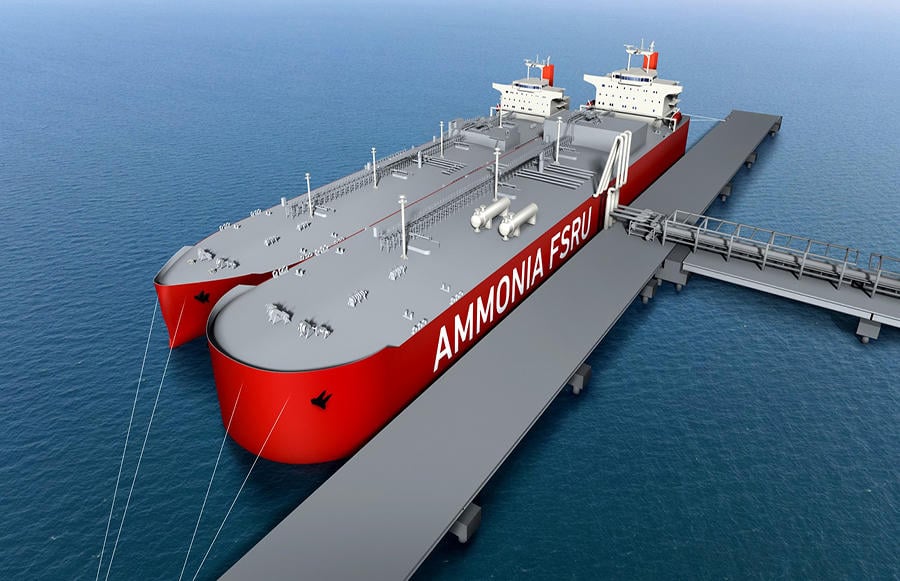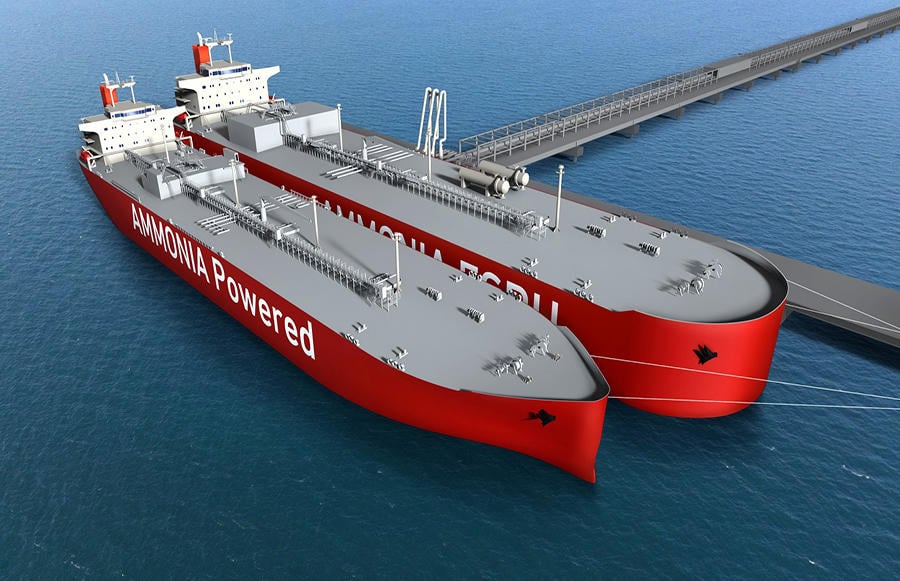Press Information
Mitsubishi Shipbuilding Completes Conceptual Study on Floating Storage and Regasification Unit (FSRU) for Ammonia Together with Mitsui O.S.K. Lines
-- FSRU Will Promote Use of Ammonia as Energy Contributing to Decarbonization --
-- FSRU Will Promote Use of Ammonia as Energy Contributing to Decarbonization --
・ Mitsubishi Shipbuilding studied various specifications and conditions, and developed conceptual designs of more environmentally friendly Ammonia FSRU
・ An MOU has been concluded with Mitsui O.S.K. Lines and Kansai Electric Power toward realizing the world’s first Ammonia FSRU


Image of Ammonia FSRU
Tokyo, February 3, 2022 - Mitsubishi Shipbuilding Co., Ltd., a part of Mitsubishi Heavy Industries (MHI) Group, has completed a conceptual study, in a joint effort with Mitsui O.S.K. Lines, Ltd. (MOL), on floating storage and regasification unit (FSRU) for ammonia. The study is aimed at promoting utilization of ammonia as an energy source that contributes to decarbonization, and the introduction of ammonia FSRU all over the world.
Ammonia FSRU is a floating facility for receiving and storing ammonia which is transported in a liquid state from its production area, and the stored ammonia is then heated and regasified onboard for transfer to an onshore pipeline. Ammonia FSRU can be constructed at a lower cost and in a shorter time than onshore ammonia storage and regasification plants. At a time when global interest in usage of ammonia is increasing, the application of Ammonia FSRU in place of onshore storage and regasification plants is expected to contribute to earlier and stable supply of ammonia fuel.
In the newly completed conceptual study, Mitsubishi Shipbuilding conducted multiple case studies of FSRU which have different specifications according to the ammonia’s supply conditions, regasification method, tank capacity, etc., in order to respond to a wide range of demands, and eventually developed designs of more environmentally friendly Ammonia FSRU. The study also covered the feasibility of employing ammonia fuel to generate the power required for the operation of the FSRU itself.
In addition, Mitsubishi Shipbuilding has just concluded a memorandum of understanding (MOU) with MOL and The Kansai Electric Power Co., Inc. whereby the parties will examine the possibilities of future introduction of Ammonia FSRU. They are aiming at realization of the first Ammonia FSRU in the world, making the most of Mitsubishi Shipbuilding’s expertise in ammonia handling technologies.
Ammonia is now mainly used as a raw material of fertilizers, and although the volume of maritime transportation is limited so far, the demand is expected to increase in the future as a next-generation clean energy that does not emit CO2 when burned. In the global trend toward decarbonization, movements toward making strategic use of ammonia are increasing, especially in Asia.
Going forward, according to MHI Group’s strategy of advancement of the energy transition, Mitsubishi Shipbuilding will strive to promote decarbonization of the maritime industry as well as to contribute to realizing a carbon-neutral society and reduction of environmental load on a global scale, by utilizing its technologies and expertise in ammonia handling accumulated through its long experience in building multi-gas carriers for transporting LPG and ammonia.
About MHI Group
Mitsubishi Heavy Industries (MHI) Group is one of the world’s leading industrial groups, spanning energy, smart infrastructure, industrial machinery, aerospace and defense. MHI Group combines cutting-edge technology with deep experience to deliver innovative, integrated solutions that help to realize a carbon neutral world, improve the quality of life and ensure a safer world. For more information, please visit www.mhi.com or follow our insights and stories on spectra.mhi.com.






